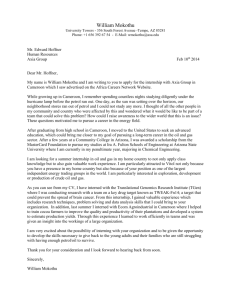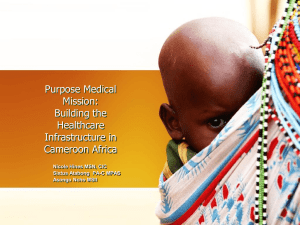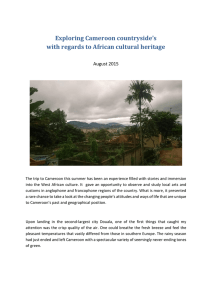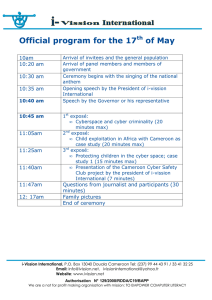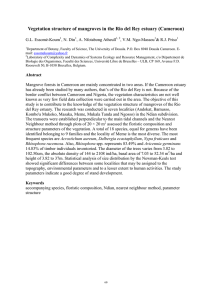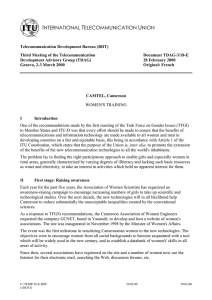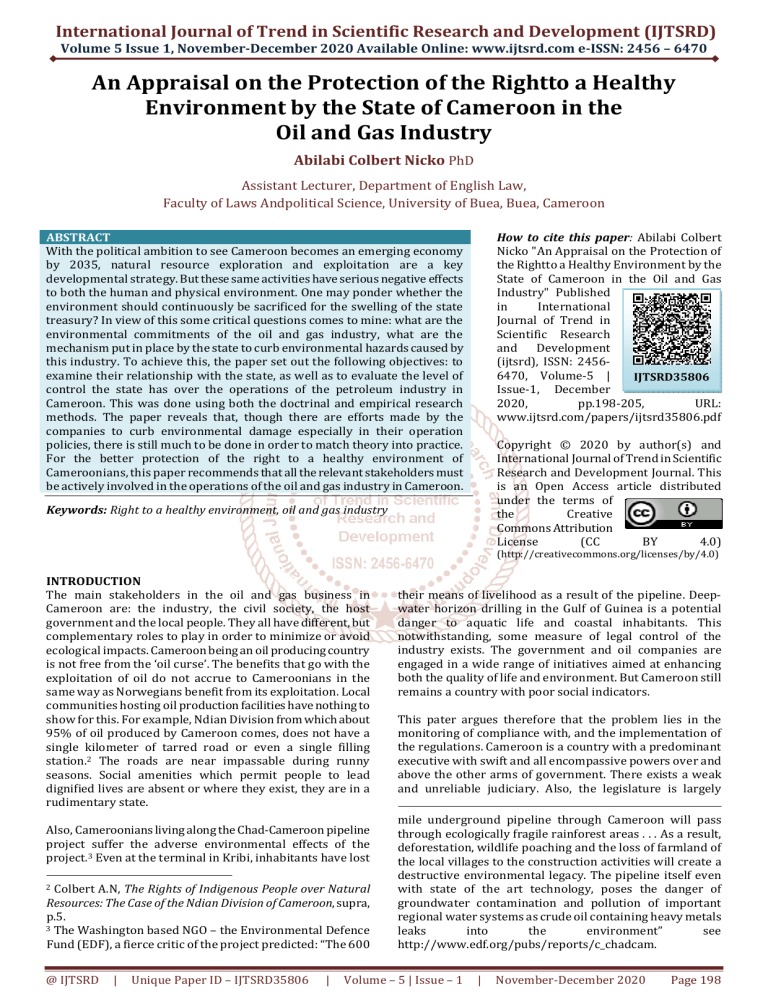
International Journal of Trend in Scientific Research and Development (IJTSRD)
Volume 5 Issue 1, November-December 2020 Available Online: www.ijtsrd.com e-ISSN: 2456 – 6470
An Appraisal on the Protection of the Rightto a Healthy
Environment by the State of Cameroon in the
Oil and Gas Industry
Abilabi Colbert Nicko PhD
Assistant Lecturer, Department of English Law,
Faculty of Laws Andpolitical Science, University of Buea, Buea, Cameroon
How to cite this paper: Abilabi Colbert
Nicko "An Appraisal on the Protection of
the Rightto a Healthy Environment by the
State of Cameroon in the Oil and Gas
Industry" Published
in
International
Journal of Trend in
Scientific Research
and Development
(ijtsrd), ISSN: 24566470, Volume-5 |
IJTSRD35806
Issue-1, December
2020,
pp.198-205,
URL:
www.ijtsrd.com/papers/ijtsrd35806.pdf
ABSTRACT
With the political ambition to see Cameroon becomes an emerging economy
by 2035, natural resource exploration and exploitation are a key
developmental strategy. But these same activities have serious negative effects
to both the human and physical environment. One may ponder whether the
environment should continuously be sacrificed for the swelling of the state
treasury? In view of this some critical questions comes to mine: what are the
environmental commitments of the oil and gas industry, what are the
mechanism put in place by the state to curb environmental hazards caused by
this industry. To achieve this, the paper set out the following objectives: to
examine their relationship with the state, as well as to evaluate the level of
control the state has over the operations of the petroleum industry in
Cameroon. This was done using both the doctrinal and empirical research
methods. The paper reveals that, though there are efforts made by the
companies to curb environmental damage especially in their operation
policies, there is still much to be done in order to match theory into practice.
For the better protection of the right to a healthy environment of
Cameroonians, this paper recommends that all the relevant stakeholders must
be actively involved in the operations of the oil and gas industry in Cameroon.
Copyright © 2020 by author(s) and
International Journal of Trend in Scientific
Research and Development Journal. This
is an Open Access article distributed
under the terms of
the
Creative
Commons Attribution
License
(CC
BY
4.0)
Keywords: Right to a healthy environment, oil and gas industry
(http://creativecommons.org/licenses/by/4.0)
INTRODUCTION
The main stakeholders in the oil and gas business in
Cameroon are: the industry, the civil society, the host
government and the local people. They all have different, but
complementary roles to play in order to minimize or avoid
ecological impacts. Cameroon being an oil producing country
is not free from the ‘oil curse’. The benefits that go with the
exploitation of oil do not accrue to Cameroonians in the
same way as Norwegians benefit from its exploitation. Local
communities hosting oil production facilities have nothing to
show for this. For example, Ndian Division from which about
95% of oil produced by Cameroon comes, does not have a
single kilometer of tarred road or even a single filling
station.2 The roads are near impassable during runny
seasons. Social amenities which permit people to lead
dignified lives are absent or where they exist, they are in a
rudimentary state.
Also, Cameroonians living along the Chad-Cameroon pipeline
project suffer the adverse environmental effects of the
project.3 Even at the terminal in Kribi, inhabitants have lost
2
Colbert A.N, The Rights of Indigenous People over Natural
Resources: The Case of the Ndian Division of Cameroon, supra,
p.5.
3 The Washington based NGO – the Environmental Defence
Fund (EDF), a fierce critic of the project predicted: “The 600
@ IJTSRD
|
Unique Paper ID – IJTSRD35806
|
their means of livelihood as a result of the pipeline. Deepwater horizon drilling in the Gulf of Guinea is a potential
danger to aquatic life and coastal inhabitants. This
notwithstanding, some measure of legal control of the
industry exists. The government and oil companies are
engaged in a wide range of initiatives aimed at enhancing
both the quality of life and environment. But Cameroon still
remains a country with poor social indicators.
This pater argues therefore that the problem lies in the
monitoring of compliance with, and the implementation of
the regulations. Cameroon is a country with a predominant
executive with swift and all encompassive powers over and
above the other arms of government. There exists a weak
and unreliable judiciary. Also, the legislature is largely
mile underground pipeline through Cameroon will pass
through ecologically fragile rainforest areas . . . As a result,
deforestation, wildlife poaching and the loss of farmland of
the local villages to the construction activities will create a
destructive environmental legacy. The pipeline itself even
with state of the art technology, poses the danger of
groundwater contamination and pollution of important
regional water systems as crude oil containing heavy metals
leaks
into
the
environment”
see
http://www.edf.org/pubs/reports/c_chadcam.
Volume – 5 | Issue – 1
|
November-December 2020
Page 198
International Journal of Trend in Scientific Research and Development (IJTSRD) @ www.ijtsrd.com eISSN: 2456-6470
captured by the executive, rendering it incapable of
performing its roles which consists of representing
constituent interests, making or shaping public policy and
overseeing policy implementation by the executive branch
and its agencies.4 The inability of the legislature to legislate
appropriately and to oversee effectively is at the root of the
mismatch between oil industry activities and their inability
to enhance the human right to development and the right to
a healthy environment. This mismatch is at the base of the
disparity between normative expectations and observed
outcomes. This paper therefore examines the roles of the
state via its three arms in overseeing the industry’s activity.
The Executive Arm of Government
The host government has a role in establishing a regulatory
and institutional framework with effective enforcement
mechanisms to ensure compliance. For this purpose
therefore, the government needs to have a solid
understanding of exploration and production operations and
how they may adversely affect the environment. To avoid
duplication of functions, a single government ministry or
agency such as the ministry of environment and Nature
Protection should be responsible for overseeing and
approving a company’s environmental strategy and work
plan.
In Cameroon, the executive is so powerful that the other
arms of government have little or nothing to say when it
comes to deciding on the style and rate of enforcement and
implementation of rules and regulations in Cameroon let
alone talk of norms relating with the right to healthy
environment of the denizens of Cameroon. The executive
have coerced the state powers so much so that the legislator
and judicial powers have become stooges before the
executive arm. The executive in Cameroon rule the country
via decrees, ministerial orders, decision, etc. There are
plethora of instances where the presidential decrees
supersede the law, where the president as head of the
executive rules the country by presidential decrees.
The fact that he is the head of the judiciary and the
constitution gives him the power to delegate his power, the
delegation of his powers to his ministers have been styled
that, the ministers can also sub-delegate their delegated
powers to their subordinates. Hence, going against the legal
maxim: Delegatus non protest delegare. Presidential power
even extends to judicial powers and such decrees can even
oust the jurisdiction of the court to question the legality of
such rule. For better understanding of the level of usurpation
of the executive powers in Cameroon, we have dealt in detail
with the performance of the other two arms of government
in Cameroon that is the legislator and judiciary.
The Role of the Legislator
The legislature faces constraints in fulfilling their roles and
responsibilities, including weak individual and institutional
capacity, little independence from the more powerful
executive and ruling political party, and limited political
will.5Decades today, natural resources have been a source of
power and wealth for the country’s ruling elites and for
4
Shari B, & Barrie H, Transparency and Accountability in
Africa’s Extractive Industry: The Role of the Legislature, NDI,
2007.
5www.globalreporting.org (last visited July 15, 2017).
@ IJTSRD
|
Unique Paper ID – IJTSRD35806
|
multinational corporations, and less often for ordinary
Cameroonians. Competition for control of revenues from
natural resources has fueled cycles of corruption and
poverty, forestalling opportunities to spur economic growth
and social development.
Today, resource-rich African nations like Cameroon are
earning rising profits from their natural wealth as a result of
the decline of global mineral and petroleum resources in
other countries and continents the world over. If these
resources are to be used effectively and harnessed for
development, more accountable and transparent
mechanisms must be developed and supported by the
government, multinational corporations, the legislature,
political parties, civic organizations and the media.
Democratic governance requires legislatures to serve three
purposes: represent citizen interests; make or shape laws
and policies; and oversee the executive.6 In the management
and control of the activities of the oil industry, legislators
bear responsibility for ensuring that policy and regulatory
frameworks support their sustainable use and exploitation,
and that government agencies appropriately allocate and
account for revenues.7 Here, we shall discuss role of elected
political officials in the legislative branch of government-in
serving as constructive leaders in improving the oversight
and management of the country’s oil resources so as to
achieve economic development. This section identifies the
challenges that Cameroonian legislators face in overseeing
the country’s oil industry.
A weak legislature cannot serve as a counterweight to a
more powerful executive branch of government. In
Cameroon, the concept of party loyalty is so strong that the
legislature is marginalized from the decision-making process
and dissuaded from conducting oversight activities. The
ruling party control is pervasive, and the legislature is often
used to rubber-stamp executive policy after little or no
debate.8 Constitutions, legislation and other rules of
procedure often vest significant legal authority in the
executive, thereby diminishing the ability of legislatures to
oversee the oil sector.9 The complex environment, in which
oil exploitation frequently occurs, makes it particularly
difficult for legislators to exercise effective oversight.
Cameroonian law does not grant the National Assembly the
power to investigate state-owned companies.10 Legislators
are often under pressure to pass budgets within timeframes
that do not allow for diligent review.11
6Ibid.,
at p. 10.
7 The National Democratic Institute for International Affairs
(NDI) believes that African legislatures could play more
robust roles in creating viable oversight mechanisms to
monitor the collection and use of revenues from extractive
industry revenues, and in ensuring that the interests of civil
society and citizens are taken into account, from communitylevel environmental concerns to the allocation and
disbursement of revenues collected by central governments.
8Ibid.
9 Ibid.
10 See Part III, Chapter I of the Constitution of Cameroon.
11MbahKenaston, “Parliament Brushes Finance Bill With the
Speed of Light”, The Post, No. 0267, March 8th 2002.
Volume – 5 | Issue – 1
|
November-December 2020
Page 199
International Journal of Trend in Scientific Research and Development (IJTSRD) @ www.ijtsrd.com eISSN: 2456-6470
In a large number of the countries surveyed by the National
Democratic Institute for International Affairs,12 legislators
are sidelined by more powerful executives, and often lack
the information and skills to fulfill their core functions. When
the role of the legislative branch as a counterbalance to
executive power is not fully developed, customary practice
frequently gives the executive disproportionate power and
authority.13
Regulation and oversight of the extractive industries
requires an understanding of complex technical and financial
issues. In Cameroon, the ability of individual legislators to
understand and contribute to extractive sector management
and oversight is worrisomely weak. The lack of formal
education among certain legislators accounts for the lack of
understanding.14 Equally, high turnover in the legislature
makes it difficult for legislators to build up specific areas of
expertise over time.15
While current efforts to increase transparency and
accountability in the management of oil resources emphasize
the roles and responsibilities of a broad range of actors,
relatively little attention has been paid to the potential
contribution of elected legislators. Yet, the three core
functions of the legislative body-representing constituent
interests, making or shaping public policy, and overseeing
policy implementation by executive branch agencies-are
central to any effort in this area.
The recognition of the need to improve the management of
the extractive industry in Cameroon presents a unique
opening for legislators to establish themselves as relevant
and credible actors in the movement towards greater
transparency, accountability and responsiveness in
government. Initiatives like the Extractive Industries
Transparency Initiative (EITI) and Publish What You Pay
(PWYP) Coalition have drawn worldwide attention to the
need for increased transparency and accountability in the
management of extractive industries. The result is
unprecedented international political will, information and
tools for reforming the management of the extractive
industries. Similarly, the window of opportunity for
legislators to prove themselves as relevant and capable
actors in the debate over extractive industry management
closed firmly in a country like Cameroon where the
legislature has limited credibility in the eyes of citizens.
Oversight of the extractive industries is further complicated
by a common perception held by many legislators
themselves that the industry’s technical complexity is
beyond their comprehension.16 Shari and Barrie17 do not
12 Shari, B & Barrie H., “ Transparency and Accountability in
Africa’s Extractive Industries” National Democratic Institute
for International Affairs (NDI) 2007
13 Ibid.
14 Some MPs do not have above the First School Leaving
Certificate, and so deliberations do not interest them. See
VeneghoFon, “MPs sleeping during deliberations in the
Hemicircle at Ngoa-ekele”, The Post News Paper, No. 0356,
February 2003.
15http://en.wikipedia.org/cameroonian_parliamentary_elect
ions_2002,(Last visited 24/12/2019).
16 The National Democratic Institute for International Affairs
(NDI) believes that African legislatures could play more
@ IJTSRD
|
Unique Paper ID – IJTSRD35806
|
make particular reference to Cameroon. However, the study
was carried out in Africa not excluding Cameroon. Therefore,
the results hold true for Cameroon. Faced with proposals
from well-informed or connected executive branch agencies
or officials, legislators often lack both the information and
the confidence to influence legislation, policy or the
management of the extractive industry.
The ultimate responsibility for the management of a
country’s oil resource wealth lies with that country’s elected
government. The principal means of ensuring a sound
management at all stages of oil resource exploitation – from
extraction to the collection and expenditure of revenues – is
through the adoption of practices that adhere to and
reinforce agreed-upon standards of accountability and
transparency. Countries that have successfully used
proceeds from the extractive industries for national
development purposes, like Australia, Canada and Norway,
have such practices in common.18 According to a study
commissioned by the World Bank,
Our findings stress the importance of strong (or at
least strengthened) institutions in the wake of
natural resource discoveries as a way to curb the
negative growth effects of corruption. This is
especially true in less developed countries where
natural resource discoveries have a much higher
relative impact on both the capital stock and the
extent of corruption, and are confronted with
generally weaker and less adaptable institutions.19
Accountable governments face two principal challenges in
determining the policy framework for the exploitation of oil
and minerals in their countries. First, they must create a
business climate that attracts private investment, a
necessary precondition for the development of the extractive
industries. Second, they must address relevant domestic
policy issues, such as the environmental impact on
communities affected by extractive activities, and ensure the
equitable distribution of profits from the industry. Policy or
regulatory frameworks and laws governing the exploitation
and management of natural resources are often spread
robust roles in creating viable oversight mechanisms to
monitor the collection and use of revenues from extractive
industry revenues, and in ensuring that the interests of civil
society and citizens are taken into account, from communitylevel environmental concerns to the allocation and
disbursement of revenues collected by central governments.
17 Ibid.
18 These include, among others, British Petroleum (BP)(U.K.),
Chevron/Texaco (U.S.), Cosmo Oil (Japan), Marathon Oil
(U.S.), Petro-Canada (Canada), Premier Oil (U.K.), Shell
International (Netherlands), Statoil (Norway), Suncor
Energy (Canada), Total (France), and Bowleven (U.K.) Global
Reporting Initiative, GRI Reporters per Sector, at http://
www.globalreporting.org/guidelines/rep_sector.asp?sector=
47&SeaCou2=Search (last visited May 1, 2018).
19Leite and Weidman, quoted in Marshall, Ian, A Survey of
Corruption Issues in the Mining & Mineral Sector. England:
International
Institute
for
Environment
and
Development,2001.Availableonlineat:http://www.iied.org/
mmsd/mmsd_pdfs/marshall_corruption.pdf, ( Last visited
26/4/2018).
Volume – 5 | Issue – 1
|
November-December 2020
Page 200
International Journal of Trend in Scientific Research and Development (IJTSRD) @ www.ijtsrd.com eISSN: 2456-6470
across different pieces of legislation and other government
instruments.
In most cases, constitutions vest natural resources in the
people but grant the government the authority to manage
those resources on their behalf. In some cases, constitutions
specify formulae for revenue sharing between national and
state or regional levels of government. Mining or oil codes
specify procedures and parameters for the granting of
concessions and other rights of access, general conditions for
exploitation, royalties, taxes, and other incentives specific to
the extractive industries. Corporate tax structures and laws
governing employment, the environment, and occupational
health and safety also have implications for extractive
industry management. Through their lawmaking functions,
legislators can support the passage of laws or other
instruments that create an enabling environment for
sustainable and accountable management of oil and
minerals.
Recommendations made by the Norwegian Parliament
helped determine the appropriate management systems
when large offshore oil and gas deposits were discovered in
the late 1960s. The Norwegian legislature continues to play a
central role in overseeing the management of the extractive
industries. Regrettably, legislators from a number of African
countries described situations in which they were under
pressure to move legislation forward quickly, often without
amendment, because funding from international
development partners depended on the passage of
legislation.20 Confidentiality clauses are also often used to
prevent public scrutiny of contract details.21
In the most successful economies, the state’s role as
facilitator of investment is balanced by its role, for
example, as regulator – establishing laws and policies
that provide for regional land use planning,
ameliorate environment and social impacts, or take
advantage of the opportunity to develop roads,
schools, and better health care.22
The Cameroon legislator’s inability to monitor and oversee
the activities of the oil industry so as to guarantee the rights
to development and a healthy environment is clearly
portrayed in the Chad-Cameroon pipeline project.
The Role of the Judiciary
One of the maxims of equity is that, where there is a right,
there is a remedy. This means that Cameroonians should be
capable of enforcing the rights to a healthy environment. For
this to be possible, the credibility, predictability and
reliability of Cameroon’s judiciary system must be detained
for questioning. This section argues that the judiciary does
not enhance the enjoyment of this right.
20
www.globalreporting.org/about/faq.asp (last visited
July15, 2018).
21www.globalreporting.org (last visited July 15, 2017), p. 11.
22 The Mining, Minerals and Sustainable Development
Project: Breaking New Ground: Mining Minerals and
Sustainable Development. (London: Earthscan Publications
Ltd, 2002). Report for the International Institute for
Environment and Development and the World Business
Council for Sustainable Development.
@ IJTSRD
|
Unique Paper ID – IJTSRD35806
|
The United Nations HumanRights Committee had earlier in
1994 observed that Cameroon's judiciary fails to meet
internationally accepted norms of independence. After
reviewing Cameroon's 1994 periodic report on the state of
humanrights in the country, the United Nations Human
Rights Committee questioned “the independence of the
judiciary. In particular, the composition of the Higher Judicial
Council is not such as toguarantee respect for this
principle.”23 Five years later in 1999, when considering
Cameroon's third periodic report, the United Nations Human
Rights Committee again observed that Respondent still had
not addressed all the concerns it had previously expressed in
its concluding observations on the second report of 1994.24
The lack of an independent or impartial judiciary severely
compromises the competence of any domestic court in
handling a case before it. It is therefore very unlikely that
any action brought before a court in Cameroon to vindicate
the right to a healthy environment will succeed. Perhaps the
better option may be to seize an international tribunal for
example the African Commission on Human and Peoples
Rights.25
It is trite law that before resorting to an international
tribunal to redress a grievance against a state for injury on
its national(s), that person(s) must first exhaust all available
domestic remedies, unless, of course, such remedies are
inadequate or their application is unreasonably prolonged.26
Support for this rule was provided by the Permanent Court
of International Justice in the Switzerland v. United States,27
where the Court noted that the “rule that local remedies
must be exhausted before international proceedings may be
instituted is a well-established rule of customary
international law.”
This rule is also recognized by the Banjul Charter and the
jurisprudence of the African Commission. Article 56(5) of the
Banjul Charter requires the pursuit and exhaustion of
domestic remedies before instituting any proceedings before
the African Commission.28 The African Commission
recognizes the fact that the requirement to exhaust domestic
remedies is a necessary first step before the institution of
23
U.N. H.R. Comm., Concluding Observations of the Human
Rights Committee: Cameroon. 18/04/94, U.N. Doc.
CCPR/C/79/Add.33, at 14 (Apr. 18, 1994).
24 U.N. H.R. Comm., Concluding Observations of the Human
Rights Committee: Cameroon. 04/11/99., U.N. Doc.
CCPR.C.79.Add.116, at 2 (Nov. 4, 1999).
25However, the African Commission will require the
exhaustion of local remedies by the claimant before
accepting to entertain the matter.
26 Generally Restatement, Comment and Reporters' Notes
(1987).
27Interhandel (Switz. v. U.S.), 1959 I.C.J. Rep. 6, 26-27 (March
21). For a recent discussion by the World Court of the local
remedies rule, see ElettronicaSicula, S.p.A (ELSI) (United
States v. Italy), 1989 I.C.J. 15,28 I.L.M. 1111 (July 20).
28 African Charter on Human and Peoples' Rights, June 27,
1981, OAU Doc. CAB/LEG/67/3/Rev.5, reprinted at 21 I.L.M.
58 (1982). The Charter was adopted by the Organization of
African Unity on June 27, 1981 and entered into force
October 21, 1986. See precisely art. 56(5).
Volume – 5 | Issue – 1
|
November-December 2020
Page 201
International Journal of Trend in Scientific Research and Development (IJTSRD) @ www.ijtsrd.com eISSN: 2456-6470
international proceedings. In this connection, it has
advanced three practical reasons.29
The first of these is the need to “give domestic courts an
opportunity to decide upon cases before they are brought to
an international forum, thus avoiding contradictory
judgments of law at the national and international level.”30
Secondly, that a government against whom a complaint has
been brought “should have notice of a human rights violation
in order to have an opportunity to remedy such violation,
before being called to account by an international tribunal ...
The exhaustion of domestic remedies requirement should be
properly understood as ensuring that the State concerned
has ample opportunity to remedy the situation of which
applicants complain.”31 Finally, the requirement of prior
exhaustion of domestic remedies before knocking at the
door of the African Commission is intended to ensure that
the African Commission does not become a “tribunal of first
instance for cases which an effective domestic remedy
exists.”32
The International Law Commission's Draft Articles on
Diplomatic Protection,33 which deals with the exceptions to
the local remedies rule in its Article 15, outlines five
different situations in which local courts offer no prospect of
redress. Article 15(a) provides that “local remedies do not
need to be exhausted where (a) there are no reasonably
available local remedies to provide effective redress, or the
local remedies provide no reasonable possibility of such
remedies.”34 In Commenting on this article, the drafter
suggests instances when the requirement of exhaustion of
local remedies may be dispensed with: (i) local courts are
notoriously lacking in independence; (ii) there is consistent
and well-established line of precedents adverse to the
claimant; and (iii) the respondent State does not have an
adequate system of judicial protection.35
This draftsman could be focusing on the Cameroon judiciary
system in making the comments. This is because the three
points highlighted in the comment vividly capture the
situation of Cameroon’s judiciary system. The Cameroonian
courts are notorious of being dependent on the executive as
there is no real separation of power between the executive
and judicial branches of government. In addition, the system
of judicial protection is inadequate, given that the courts are
over-burdened and corrupt.36
In Cameroon, the President is the Supreme Judge and is
entrusted with superfluous powers at the expense of the
29 The Social and Economic Rights Action Center for Economic
and Social Rights v. Nigeria, African Commission on Human
and Peoples' Rights, Communication No. 155/96, 37-39.
30 Ibid.
31 Ibid.
32 Ibid.
33 I.L.C., Draft Articles On Diplomatic Protection, Report Of
The I.L.C., 55th Sess. GAOR, 58th Sess., Supp. 10, U.N. Doc.
A/58/10, at 76 (May 5-9, 2003).
34 Ibid.
35 Ibid.
36NdivaKofele-Kale, “Asserting Permanent Sovereignty Over
Ancestral Lands: The Bakweri Land Litigation Against
Cameroon”, Annual Survey of International and Comparative
Law.
@ IJTSRD
|
Unique Paper ID – IJTSRD35806
|
Judiciary. In promulgating the basic law of the land, the
constitutional drafters set out to create an “imperial
presidency”37 by making this institution the font of a vast
array of judicial and non-judicial powers.38 Under this kind
of system, the final say on domestic remedies, whether of an
administrative or legal nature, in the Cameroonian context, is
in the hands of the President of the Republic. Although the
Constitution provides for a separation of powers among the
three branches of government, in reality the Executive
overshadows the other two branches. The U.S. State
Department describes Executive power in Cameroon as
follows:
….the president is empowered to name and dismiss
cabinet members, judges, generals, provincial
governors, prefects, sub-prefects, and heads of
Cameroon's para-statal firms, obligate or disburse
expenditures, approve or veto regulations, declare
states of emergency, and appropriate and spend
profits of parastatal firms. The president is not
required to consult the National Assembly. The
judiciary is subordinate to the executive branch's
Ministry of Justice. The Supreme Court may review
the constitutionality of a law only at the president's
request. 39
Presidential decisions therefore carry a kind of res judicata
effect on other state institutions and organs.40This scenario
epitomizes the fact that Cameroon’s judiciary lacks
independence, since it is largely captured by the President of
the Republic. In its 1999 Human Rights Report on Cameroon,
the United States Department of State described Cameroon's
judiciary as one that “cannot act independently and
impartially, since all judges and magistrates are directly
nominated by the President.” The Report goes on to observe
that “politically sensitive cases are never heard.”41 Judicial
officers owe their appointments to the President (Article
37(3))42 and serve at his pleasure.
37MbuEtonga, An Imperial Presidency: A Study of Presidential
Power in Cameroon, inAn African Experiment in Nation
Building: The Bilingual Cameroon Republic Since
Reunification, 133-158 (NdivaKofele-Kale, ed., 1980).
38NdivaKofele-Kale, “Asserting Permanent Sovereignty Over
Ancestral Lands: The Bakweri Land Litigation Against
Cameroon”, (2007), supra.
39 U.S. Dep't of State, Background Notes: Cameroon (Oct.
2006),
available
at
http://www.state.gov/r/pa/ei/bgn/26431.htm.
40The doctrine of res judicata holds that a matter which has
received a final judgment by a court of final jurisdiction, such
as the Supreme Court, cannot be opened again for hearing on
its merits.
41 U.S. State Department, 1999 Country Reports on Human
Rights: Cameroon (Feb. 23, 2000), available at
http://www.state.gov/g/drl/rls/hrrpt/1999/231.htm.
42 “The President of the Republic shall guarantee the
independence of judicial power. He shall appoint members of
the bench and of the legal department. He shall be assisted in
this task by the Higher Judicial Council which shall give him
its opinion on all nominations for the bench and on
disciplinary action against judicial and legal officers ....” See
Law No. 65 of 96-06 of 18 January 1996 to amend the
Constitution of 2 June 1972, Article 37(3).
Volume – 5 | Issue – 1
|
November-December 2020
Page 202
International Journal of Trend in Scientific Research and Development (IJTSRD) @ www.ijtsrd.com eISSN: 2456-6470
This power of appointment and removal is like a sword of
Damocles dangling over the heads of judges, ready to
descend the moment one of them steps out of line. In theory
though, the President is assisted by the Higher Judicial
Council in the appointment of members of the bench and
officials of the legal department.43 It is this body, sitting in
council that decides the fate of all judicial officers from
judges, magistrates, prosecutors of the Republic, down to
senior court registrars. However, this organ, which is
responsible for all appointments, promotions and dismissals
in the judiciary, is completely under the control of the
President, who appoints the majority of its members and
presides over all its meetings.44
The Bakweri Land Litigation against Cameroon,45 provide an
insight on the issue of the supremacy of the Presidency and
its dominance over the judiciary in Cameroon.46 It argued
that this supremacy and dominance has given rise to a
peculiar form of de facto Executive ‘preemption’ of decisionmaking by subordinate state organs, regardless of whether
there is an actual conflict between them or not. This de facto
preemptive authority is peculiar for two reasons. First, it is
implied since the Constitution is noticeably silent on the
exercise of such authority. Second, because the underlying
constitutional objective of the preemption doctrine is to
avoid conflicting regulation of conduct by various official
bodies that might have some authority over the same subject
matter.
In the Cameroon scheme, however, presidential ‘occupation’
of the judiciary and the legislature has nothing to do with
jurisdictional conflicts. Rather, it reflects the wide range of
powers, legislative as well as judicial, that the Constitution
confers on the President.47 Presidential ‘preemption’ of
decision-making at all levels and in all areas, judicial as well
as non-judicial, operates in much the same way as an ouster
clause which bars “the ordinary courts from taking up cases
placed before the special tribunals or entertaining any
appeals from the decisions of the special tribunals.”48
43NdivaKofele-Kale,
supra.
Ibid.
45 It should be noted that complainants were seeking a
declaration from the Government of Cameroon that lands
registered in the Imperial German land registers
(Grundbuch), occupied by CDC since 1947, and defined as
Private Property under Cameroon's 1974 Land Law belong
to the Bakweri. However, such an acknowledgment that
would bind Respondent State could only come from the
authority that issued the 1994 CDC Privatization Decree in
the first place, or given on its instructions. That authority
being none other than the President and Head of State.
Although the President chose not to make such a declaration
between 1994 and the filing of the complaint before the
Commission, he could have, in theory, been compelled by
court order to do so. But such an order, BLCC submitted, was
not likely to come from a court system that is under the
President's total control and whose judges are personally
appointed, promoted or removed, by him. See NdivaKofeleKale, supra, note 603.
46NdivaKofele-Kale, note 603, supra.
47 Ibid
48 International Pen, Constitutional Rights Project Interights
on behalf of Ken Saro-Wiwa Jr. and Civil Liberties
Organization v. Nigeria.African Commission on Human and
44
@ IJTSRD
|
Unique Paper ID – IJTSRD35806
|
An examination of the legal effect of “ouster” decrees as was
the case in Nigeria’s Ken Saro-Wiwa et al., indicate that they
tend to “render local remedies non-existent, ineffective or
illusory” because they create a “legal situation in which the
judiciary can provide no check on the executive branch of
government.”49 In practice, presidential preemption ousts
the jurisdiction of the ordinary courts thus depriving
complainants of effective domestic relief. The involvement of
Executive branch officials in Ken Saro-Wiwa, illustrates what
can happen in Cameroon, where the judiciary has been
reduced to impotence, incapable of playing its traditional
role of providing a check on the executive branch.
Just like other African countries, Cameroon does not have an
independent judiciary. On the contrary, there is an implied
power of discretion built into the judicial system. Justice,
under this discretionary regime is exercised by non-judicial
power in a discretionary manner through a process of de
facto ousting of the jurisdiction of courts. This procedure
manifests itself through legal decisions made by ministers
and law enforcement officials completely by-passing the
courts.50 In theory as in practice, the President is the
Supreme Magistrate with the power to delegate some of his
powers, and by extension, his judicial powers to subordinate
officials who act in his name.51
Peoples' Rights, Communication No. 137/94, 139/94,
154/96 and 161/97.
49 Ibid.
50 Hardly a week goes by that the popular press fails to
report on this “annoying interference.” In an article entitled
Criminal Law: A conflict of systems, AsongNdifor, senior
editor of The Herald, offers these examples: “During the trial
of SCNC activists in Bamenda in 2001 the legal department
wrote to magistrate Abenego Bea instructing him on how to
handle the case. He repudiated the instruction and passed
his judgement according to the evidence he had. He was later
given a punitive transfer to the legal department in Buea.
There is also the recent case where a Buea high court ruled
that John NibaNgu should be reinstated as general manager
of the Cameroon Tea Estate but the South West legal
department rejected the ruling and refused to order
execution of the judgement.” AsongNdifor, Criminal Law: A
Conflict of Systems, THE HERALD, June 16-17 2003, at 8
(Cameroon). In the Monday, August 11, 2003 edition of The
Post newspaper, the Minister of Justice and Keeper of the
Seals is reported to have “ordered that all pending matters
concerning Beneficial Life Insurance Company be withdrawn
from court. This order is contained in a submission filed by
the Southwest Attorney General .... The Attorney-General
stated in his submission that ‘we have instructions from the
Hon. Minister of State in Charge of Justice and Keeper of the
Seals, that all pending matters in court, whether criminal or
civil, touching and concerning the parties in this case be
withdrawn from court.”’ See Minister Orders Withdrawal of
All Beneficial Life Cases, THE POST, No. 0495, Aug. 11, 2003,
at p. 2 (Cameroon).
51 Article 10(2) of the 1996 Constitution provides: “The
President of the Republic may delegate some of his powers
to the Prime Minister, other members of Government and
any senior administrative officials of the State, within the
framework of their respective duties.” See Law No. 65 of 9606 of 18 January 1996 to amend the Constitution of 2 June
1972, Article 10(2).
Volume – 5 | Issue – 1
|
November-December 2020
Page 203
International Journal of Trend in Scientific Research and Development (IJTSRD) @ www.ijtsrd.com eISSN: 2456-6470
For instance, sometime in February 2002, the Minister of
External Relations represented before another international
body that the Government was favourably disposed towards
a friendly settlement of the Bakweri matter. This
undertaking was clearly meant to signal the Government's
preference for a non-judicial resolution. Complainants in
good faith relied on this stated preference for a resolution
through dialogue to their own detriment. The Minister of
External Relations, an official with no independent authority
and whose authority is merely delegated, could not have
taken such a binding obligation without explicit directives
from the presidency.
However, the effect of this executive branch official's
decision was to preempt other organs of government,
including the courts, from looking into the Bakweri land
question.52 The African Commission had the opportunity to
pronounce on the discretionary nature of justice, when it
described a Governor's power as a “discretionary
extraordinary remedy of a non-judicial nature” and ruled
that “it would be improper to insist on the complainants
seeking remedies from sources which do not operate
impartially and have no obligation to decide according to
legal principles.”53 It goes without saying that any remedy
provided through this source is likely to be neither adequate
nor effective.
In Cameroon, courts are overburdened with cases that will
take years to clear. For instance, in 1996 the World Bank
reported that the number of cases pending before the
Cameroon Supreme Court stood at 3,000.54 Unofficial
sources however put the number at 4,343 as of June 2003.55
For example, in October 1996, a representative of Cameroon
appeared before the African Commission, at its 20th Session,
urging the Commission to overturn its decision on
admissibility in the case of Annette Pagnoulle (on behalf of
AbdoulayeMazou) v. Cameroon56on the ground that Mazou
had not exhausted his domestic remedies, whereas the case
had been pending in Cameroon's Supreme Court for four
years. Also, before petitioning the African Commission, the
case of the Victims of Post-Electoral Violence in the North
West Province v. Cameroon had languished in the Supreme
Court for five years with no relief in sight.57
52
See note 599, supra.
Rights Project v. Nigeria, African
Commission on Human and Peoples' Rights, Communication
No.60/91
54See World Bank, Technical Annex To The Memorandum
And Recommendation (Report No. P-6928-CM) On A
Proposed Credit In The Amount Equivalent To Sdr 8.8
Million To The Republic Of Cameroon For A Privatization
And Private Sector Technical Assistance Project, World Bank
Rpt No. T-6928-CM, at 6, 25 (May 22, 1996) (commenting on
the slowness of the judicial process and observed that in
1996 3000 cases were pending at the Supreme Court).
55 Ibid..
56SeeAnnette Pagnoulle (on behalf of AbdoulayeMazou) v.
Cameroon, African Commission on Human and Peoples'
Rights, Communication No. 39/90.
57Victims of Post-Electoral Violence in the North West Province
v. Cameroon, African Commission on Human and Peoples'
Rights, Communication No. 272/2003.
53SeeConstitutional
@ IJTSRD
|
Unique Paper ID – IJTSRD35806
|
Corruption also contributes to the inadequacy and
unpredictability of judicial protection offered by
Cameroonian courts. Cameroonian courts have been
routinely dismissed by expert observers as well as the
general public as corrupt ; they are institutions where justice
is for sale,58 usually to the highest bidder or to barons of the
regime. These observations have been made by the highest
ranking state official responsible for the judiciary.59 Even the
President of the Republic has acknowledged that corruption
exists in the judiciary system. In his 1999 New Year's
Address to the Nation, after lamenting the scourge of
corruption which has now spread to all sectors of
Cameroonian society, he turned his attention next to
“judicial and legal officers whose task is precisely to ensure
respect for the rules governing our society.” As regards this
branch of government, the President observed that:
There are still many cases where justice is not
rendered as it should. That is to say with dispatch
and impartiality, in strict conformity with the laws
and procedures in force. This should not be tolerated.
Even though I would want to believe so, the majority
of our judicial and legal officers are upright, the
deviant practices observed may lay the institution
open to suspicion....60
58
For instance, three out of ten Cameroonians polled by
Gallup International for Transparency International's 2003
Global Corruption Barometer, singled out the judiciary as the
institution from which they would like to eliminate
corruption if they were given the opportunity. The July 2002
Gallup survey polled 30,487 people in 44 countries on the
following question: “If you had a magic wand and could
eliminate corruption from one of the following institutions,
what would your first choice be?” The institutions
enumerated including among others, the courts, the customs,
educational system, medical services, police, etc. Thirty-one
percent of the Cameroonian respondents picked out the
courts as their first choice with the police coming in a distant
second being singled out by only 13.7 per cent of the
respondents. The Transparency International Global
Corruption Barometer: A 2002 Pilot Survey of International
Attitudes, Expectations and Priorities on Corruption, at 29
(July
2003),
available
at
http://
www.transparency.org/content/download/1566/8095/file
/barometer2003.en.pdf, (Last visited 9/3/2015).
59 While admitting that the Cameroon judiciary is corrupt,
Justice Minister Amadou Ali tries to place the blame
elsewhere: “la corruption existeparcequ'elleestentretenue
par des corrupteurs, dont beaucoup se recrutent,
malheureusement, dans le monde de l'entreprise ...
Parcequ'ilsveulent a tout prix gagnerleursprocès, des chefs
d'entreprisesapprochent des magistrats et leur font des
offresalléchantes, les amenantainsi a rendre des décisions
qui, siellesarrangentleurscommanditaires, donnent de la
justice camerounaise, l'imaged'une justice inapte à soutenir
le dévéloppement de l'entreprise et insécurisante pour les
investissements.” LE MESSAGER, no. 1519/vendredi, 06 juin
2003, at 5
60 Address by President Paul Biya, The Head of State's New
Year Message to the Nation, (Dec. 31, 1999)
Volume – 5 | Issue – 1
|
November-December 2020
Page 204
International Journal of Trend in Scientific Research and Development (IJTSRD) @ www.ijtsrd.com eISSN: 2456-6470
Conclusion
Conclusively, the picture of the judiciary in Cameroon
painted herein above suggests that an action, whether
collective or individual, to enforce the rights to a healthy
environment will yield little or no fruits. Perhaps an action
may be brought against oil MNC for violating the human
right to a healthy environment in a U.S. court under the Alien
Tort Claims Act (ATCA), which provides an opening for
prosecution of behavior that violates international law.
However, the practical and legal limits of applying the ATCA
to MNCs, casts doubts on the viability of this option. This
notwithstanding, the justiciability of economic and social
rights is problematic.61The examination of the role of the
legislature in assisting Cameroonians to enjoy the rights to a
healthy environment indicates that Cameroonians cannot
rely on the legislature. Equally, the Cameroonian judiciary
system has been shown to be unreliable.
61Deval Desai, “Courting Legitimacy: Democratic Agency and
the Justiciability of Economic and Social Rights”, (2010),
Interdisciplinary Journal of HumanRights Law.
@ IJTSRD
|
Unique Paper ID – IJTSRD35806
|
Volume – 5 | Issue – 1
|
November-December 2020
Page 205

